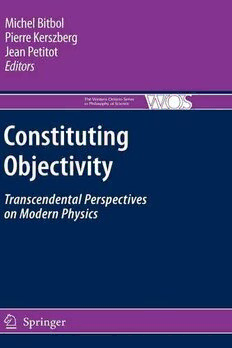Download Constituting Objectivity: Transcendental Perspectives on Modern Physics PDF Free - Full Version
Download Constituting Objectivity: Transcendental Perspectives on Modern Physics by Michael Bitbol, Pierre Kerszberg, Jean Petitot in PDF format completely FREE. No registration required, no payment needed. Get instant access to this valuable resource on PDFdrive.to!
About Constituting Objectivity: Transcendental Perspectives on Modern Physics
In recent years, many philosophers of modern physics came to the conclusion that the problem of how objectivity is constituted (rather than merely given) can no longer be avoided, and therefore that a transcendental approach in the spirit of Kant is now philosophically relevant. The usual excuse for skipping this task is that the historical form given by Kant to transcendental epistemology has been challenged by Relativity and Quantum Physics. However, the true challenge is not to force modern physics into a rigidly construed static version of Kant’s philosophy, but to provide Kant’s method with flexibility and generality. In this book, the top specialists of the field pin down the methodological core of transcendental epistemology that must be used in order to throw light on the foundations of modern physics. First, the basic tools Kant used for his transcendental reading of Newtonian Mechanics are examined, and then early transcendental approaches of Relativistic and Quantum Physics are revisited. Transcendental procedures are also applied to contemporary physics, and this renewed transcendental interpretation is finally compared with structural realism and constructive empiricism. The book will be of interest to scientists, historians and philosophers who are involved in the foundational problems of modern physics.
Detailed Information
| Author: | Michael Bitbol, Pierre Kerszberg, Jean Petitot |
|---|---|
| Publication Year: | 2009 |
| ISBN: | 9781402095092 |
| Pages: | 524 |
| Language: | English |
| File Size: | 3.616 |
| Format: | |
| Price: | FREE |
Safe & Secure Download - No registration required
Why Choose PDFdrive for Your Free Constituting Objectivity: Transcendental Perspectives on Modern Physics Download?
- 100% Free: No hidden fees or subscriptions required for one book every day.
- No Registration: Immediate access is available without creating accounts for one book every day.
- Safe and Secure: Clean downloads without malware or viruses
- Multiple Formats: PDF, MOBI, Mpub,... optimized for all devices
- Educational Resource: Supporting knowledge sharing and learning
Frequently Asked Questions
Is it really free to download Constituting Objectivity: Transcendental Perspectives on Modern Physics PDF?
Yes, on https://PDFdrive.to you can download Constituting Objectivity: Transcendental Perspectives on Modern Physics by Michael Bitbol, Pierre Kerszberg, Jean Petitot completely free. We don't require any payment, subscription, or registration to access this PDF file. For 3 books every day.
How can I read Constituting Objectivity: Transcendental Perspectives on Modern Physics on my mobile device?
After downloading Constituting Objectivity: Transcendental Perspectives on Modern Physics PDF, you can open it with any PDF reader app on your phone or tablet. We recommend using Adobe Acrobat Reader, Apple Books, or Google Play Books for the best reading experience.
Is this the full version of Constituting Objectivity: Transcendental Perspectives on Modern Physics?
Yes, this is the complete PDF version of Constituting Objectivity: Transcendental Perspectives on Modern Physics by Michael Bitbol, Pierre Kerszberg, Jean Petitot. You will be able to read the entire content as in the printed version without missing any pages.
Is it legal to download Constituting Objectivity: Transcendental Perspectives on Modern Physics PDF for free?
https://PDFdrive.to provides links to free educational resources available online. We do not store any files on our servers. Please be aware of copyright laws in your country before downloading.
The materials shared are intended for research, educational, and personal use in accordance with fair use principles.

